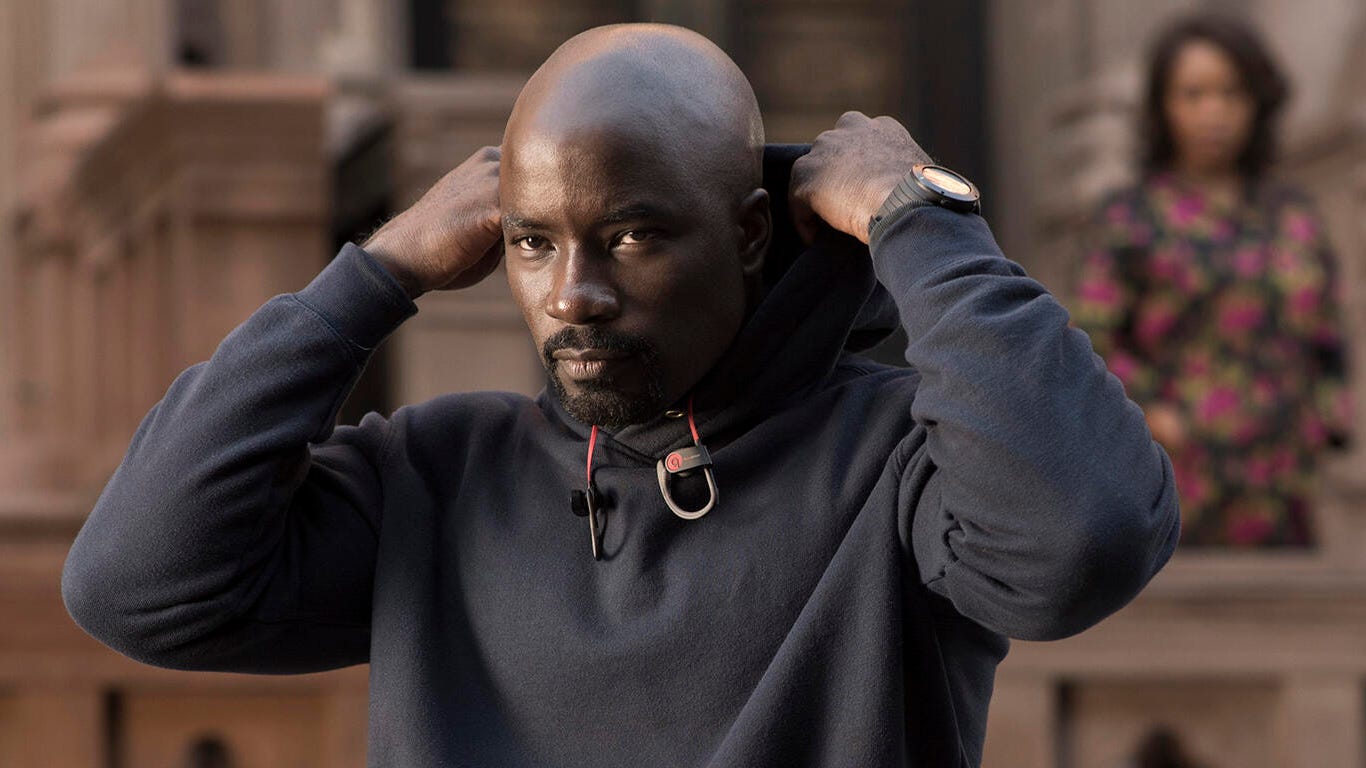
Reflecting on Luke Cage, the Pioneering Black Superhero, and His Lasting Legacy
Cheo Hodari Coker details the drama's abrupt cancellation, reveals his plans for Season 3, and reflects on 'the importance of preserving moments of black history'

Note: This feature originally ran in February 2020 for Black History Month. Amid the ongoing civil unrest around the country, TV Guide is re-publishing this story and others like it to help foster greater understanding and awareness around issues of racial justice. Black lives matter. Text DEMANDS to 55156 to sign Color of Change's petition to reform policing, and visit blacklivesmatter.carrd.co for more ways to donate, sign petitions, and protest safely.
The science on what exactly happened Saturday, Oct. 1, 2016 -- the day Marvel's Luke Cage hit Netflix -- is fuzzy, but whether due to a glitch or overwhelming demand, Netflix undoubtedly went down the day after Season 1 of the superhero drama was released. Netflix never gave an official explanation for the oopsie, but it doesn't matter: In contemporary black mythology, Luke Cage broke Netflix that fall day, just like John Henry was a real man and Beyoncé made the lights go out at the Super Bowl. Luke Cage, a bulletproof black man played with sturdy, studly aplomb by Mike Colter, was not the first black superhero lead of a TV show (that distinction belongs toM.A.N.T.I.S.in 1994) but he was the first for Marvel, the first of the 2000s, and surely the first black superhero to bring a hip-hop soaked "unapologetic blackness" to the small screen.
Subsequent years have seen people of color represented on television at record high levels, but when Luke Cage debuted in 2016, the series became part of the blackest year on television at that point in history.Empire, a huge hit for Fox, was in its second season; Atlantawas in its impressive first. Beyoncé's Lemonade made its stunning surprise debut, disrupting the definitions of both "music video" and "slay," and President Barack Obama visited Cuba with his family, thawing decades of diplomatic ice with the Caribbean nation and beaming a not-subtle message of solidarity between black and brown people to screens all over the world.
The Rise of Black Superheroes: A Black History Month Celebration
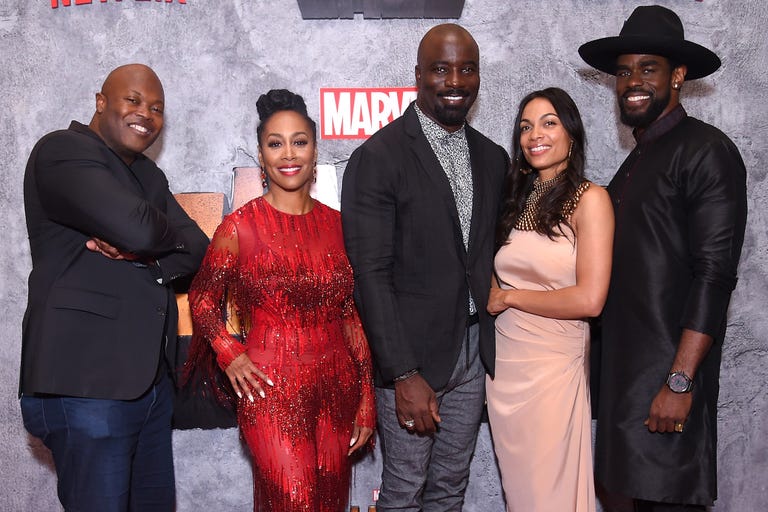
Cheo Hodari Coker, Simone Missick, Mike Colter, Rosario Dawson, and Mustafa Shakir
Michael Loccisano/Getty Images for NetflixEven for Marvel fans, Luke Cage might've been a surprising choice for a lead character in a cinematic universe full of higher-flying fighters. Before he was the main star, the Harlem hero appeared as a recurring character onMarvel's Jessica Jonesand, debuting two whole years before Black Panther grossed $1.4 billion at box offices worldwide, he was without precedent. Shepherded to the screen by executive producer Cheo Hodari Coker -- a journalist turned screenwriter who wrote for and producedNCIS: Los Angeles, Southland, and Ray Donovan -- Luke Cage titled episodes after Gang Starr songs, and in a shock to many, used the N-word. He wasn't radical for radical's sake though; Luke Cage earned an enthusiastic reception from fans and critics and helped vault actors Colter, Mahershala Ali, and Simone Missick to stardom. The show gave industry veterans -- including star Alfre Woodward, singer-songwriter Raphael Saadiq, and singer Faith Evans -- a new genre in which to showcase their talents.
And then it all came crashing down.
After participating in The Defenders crossover series in 2017 and releasing Season 2 in 2018, Luke Cage was abruptly canceled. Like sophomore albums, a show's second season opens it up to increased expectations and scrutiny, and Luke Cage was no different. Luke Cage Season 2 struck some as too stretched out, too full of improbable Jamaican accents, and too low on Misty Knight (Missick). Still, no one expected the series' cancellation in October 2018 -- particularly given that pre-production on Season 3 was well underway, with six months of work and several scripts in the can. There were unofficial reports that viewership had declined during the show's sophomore outing; but more important than stream counts, Netflix's success had gotten rivals salivating, and Disney was making plans to launch its own streaming service, Disney+, featuring new shows set within the Marvel Cinematic Universe and starring actors from the films. Although we can't say for certain it was Disney's desire to bring things in-house that killed its Netflix partnership, Luke Cage -- and eventually all of Netflix's Marvel dramas -- got the ax.
Coker, who's since signed an overall deal with Amazon, never said much publicly about what exactly happened, nor revealed details about what he had planned for Season 3. Owing to legal issues and his professional decorum, he won't. Nonetheless, when he heard TV Guide was celebrating black superheroes for Black History Month, he agreed to share what he could about Luke Cage's cancellation, its lasting impact on the culture, and what we might have seen if the show had lived on.
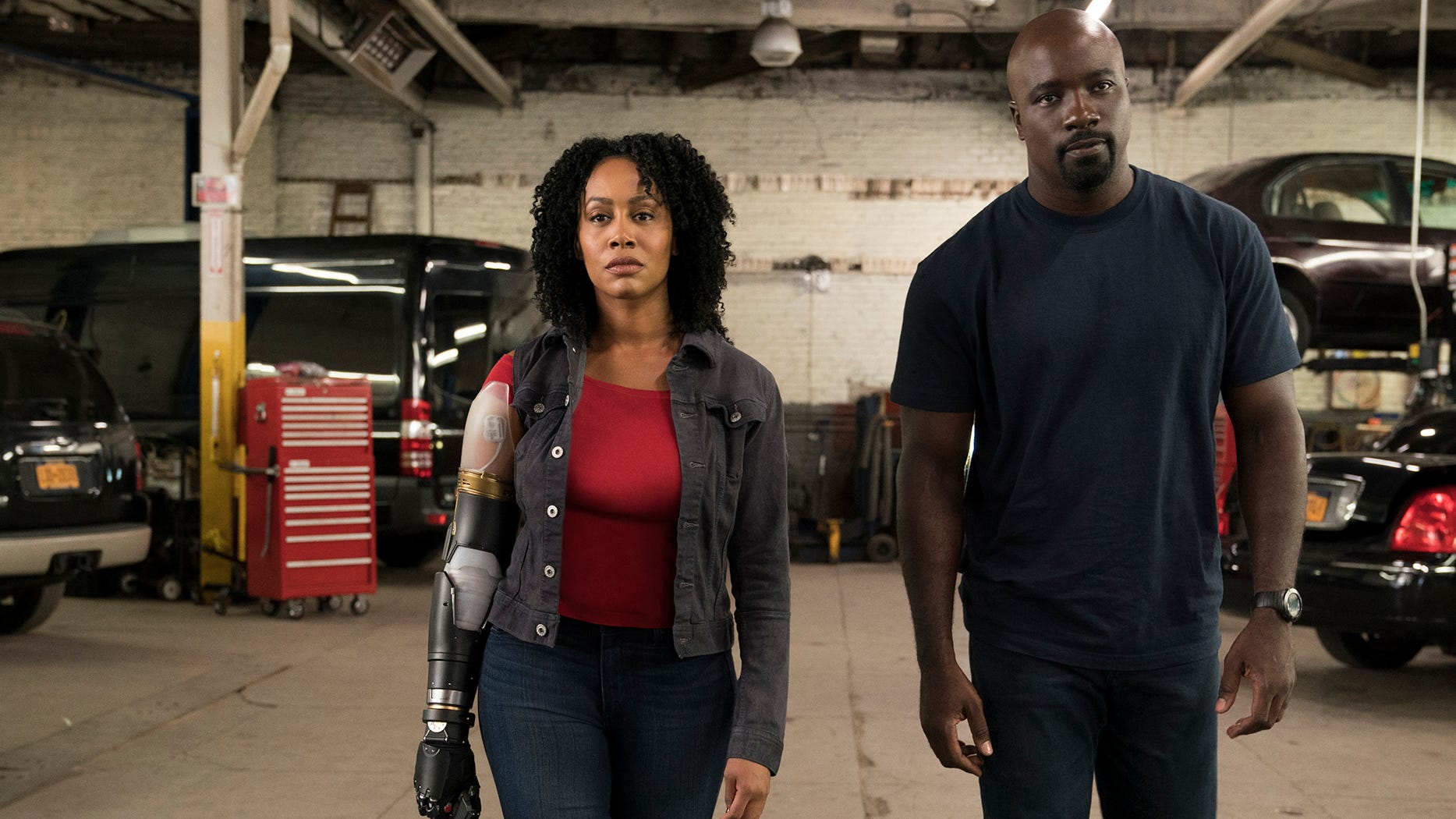
Simone Missick and Mike Colter, Luke Cage
David Lee/NetflixCan you walk me through what happened after you heard about the cancellation? How'd you respond emotionally to that -- were you mad, did you cry, did you want to be alone -- and did it influence your decision to move to Seattle at all?
Cheo Hodari Coker: No. [Laughs] On all fronts. [My wife], she's a pediatrician, and [years ago] she got a position [at a hospital] and she had the opportunity to move to Seattle. So it was like, "I'm always the one with the keyboard. So it's probably easier for me to take a plane to L.A."
Honestly, Luke Cage was the only show that ever disrupted Netflix, where it actually, you know, the servers went down. We were the only thing that ever shut down Netflix, period. I take great pride in the fact that we created something so popular we shut them down for a minute. All of a sudden it went from meeting with a junior executive on a project every time I went for a meeting to meeting with the president of the studio, the president of production. [Netflix said] they had to decide whether or not the show comes back sometime in Season 1. And so I was like, if it doesn't come back, I'm basically looking at the prospect of not having any work for six months. In addition to the twin boys, we also had a daughter. So I'm basically thinking, "OK, I can't [contractually] do another show, but I can do [films]." By the time I had just gotten through the gauntlet to get hired on Creed II, that's when all of a sudden they just announced, "Oh, you're back in the room, Jan. 5!" And so Season 2 was crazy. It was crazy! I was commuting. And I wrote that first episode of Season 2 simultaneously with my first draft of Creed II, and then I wrote the finale of Luke Cage with my final draft of Creed II, that I co-wrote. I'm on planes all the time, but when I get the call, I'm like Rocky. I literally heard the bell like in Rocky -- ding! -- I gotta do it.
It wasn't any crazy drama in the room, or you know, somebody wrote something about creative differences [leading to the cancellation]. It wasn't. It wasn't. Like, we had all 13 episodes planned out. We were seven scripts in. I honestly think it was more the dispute between Marvel and Netflix than it was anything else. So the cancellation itself did come as a bit of a surprise. But at the same time, it was frustrating because it's like, if y'all weren't gonna work it out, it would have been nice to have taken some downtime and to not have gotten me back into the room. But we had a great season [planned]. I'm still proud of the episodes we'd written and the story arcs.
Don Cheadle, David Ramsey, and More Stars Reflect on Their Black Superhero Roles
What can you tell me about what that third season would have been like?
Coker: It was crazy because we were hitting all these things that are happening in the press right now. I can't on the record talk about what we had planned because, contractually, you know, I still don't want any Marvel assassins coming out of the woodwork to try to take me out. [Laughs] But what I can say is that we had a very good season planned, and it was one that I think would have brought Luke Cage as a character full circle. You see people online that were like, "Oh my god, I turned Luke into a gangster." They wouldn't be [saying that] if they had the opportunity to see all three seasons and see the directions Luke would have gone. I was always a Luke Cage fan, but I was probably, ultimately, a Chris Claremont, Frank Miller, Wolverine, X-Men Golden Era comic book fan, you know? And it wasn't until Brian Michael Bendis rebooted Luke Cage within Jessica Jones -- that [I felt liberated to] approach established characters within the Luke Cage universe from a different perspective. ...
I'm not a casual fan of comic books. Back in the day when people would actually buy comics on a weekly basis, every Wednesday I would be at Golden Apple or somewhere, and I bonded with a lot of people, like one of my closest friends, the late John Singleton. When the opportunity came up [to do Luke Cage], I knew how big the opportunity was. It was just like, "I can't believe I'm gonna have a chance to do this."
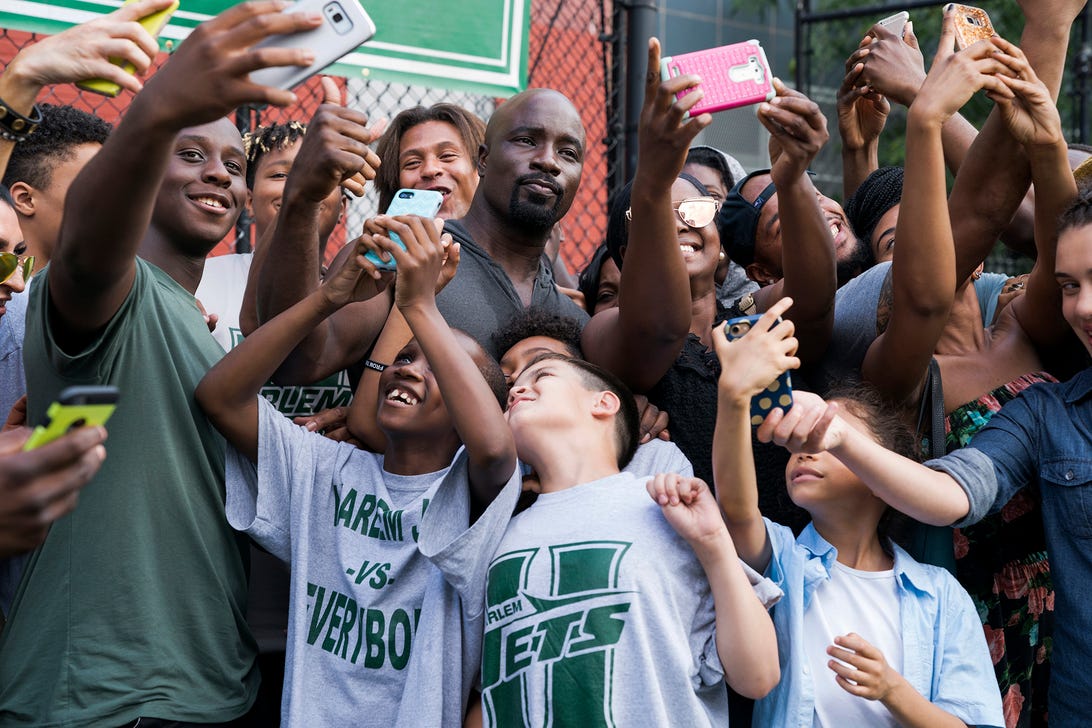
Mike Colter, Luke Cage
David Lee/NetflixYou were going to make all the episode titles in Season 3 Public Enemy songs, right?
Coker: We were going to be all Public Enemy. I tweeted it without context. The first episode was "Public Enemy No. 1." The last episode was "Rebel Without a Pause."
That makes me wonder how much you'd planned to have Luke Cage actively fight racism. Luke Cage exists mostly within a single community, dealing with community issues. But now, especially in this climate, would you have wanted to address racism more overtly -- fight the Klan, fight Nazis?
Coker: I mean, Marvel has always been rooted in reality. Like Superman -- this is not a DC diss, but Superman lives in Metropolis. He grew up in Smallville, right? In the Marvel Universe, New York City exists. One of my favorite graphic novels, or the one that's the biggest writing influence on me, was written by Chris Claremont. It's called God Loves, Man Kills. And it basically introduced a lot of the deeper themes of what it meant to be a mutant versus somebody that is born with these superpowers. And it isn't like Spider-Man getting bitten by a radioactive spider. It's not like, you know, Captain America getting super serum that transforms him. A mutant is born with their powers. So it introduces the whole notion of the "other." It introduced the whole notion of what it means to be different, what it means to be feared because of how different you are.
And so racism -- the characters talk about racism, that was never an issue with Marvel at all. As a black man writing about a black man, I wanted to be able to explore the things that black men deal with. And at the same time also understand that if you have bulletproof skin, how does a bulletproof black man change the ecology of the neighborhood? That was one of the central things that I thought about with Luke Cage. When you have somebody that can come in and deal with the street as it is, and they can't be killed by conventional means, it gives you a way to talk about everything you can talk about. If you have somebody like that, how does it affect the street? How does it upset law enforcement? And if you also have that person and they don't wear a mask and you know that you can go to the barbershop and talk to this person, how does that change things?
9 Black Superheroes Who Deserve Their Own Show
Season 1 was mostly about a character who was reluctant to accept this responsibility because he was harboring a secret, but then ultimately is forced to deal with that. And then Season 2 was more about, now that you have this bulletproof celebrity, how do you deal with being a superhero in a social media [world]? Ultimately, you kind of go into the fatigue of celebrity. How does that affect your attitude and also dealing with, to a certain extent, the black male psyche as it relates to rage. Because the Luke Cage of Season 2 is dealing with anger issues, and he doesn't even really understand what he's dealing with until his father shows up in town and all these unrelated things start coming up. That was the thing I've always liked about Luke Cage and the thing that people who liked the show really dug -- it was a deep meditation on blackness with superhero flavor.
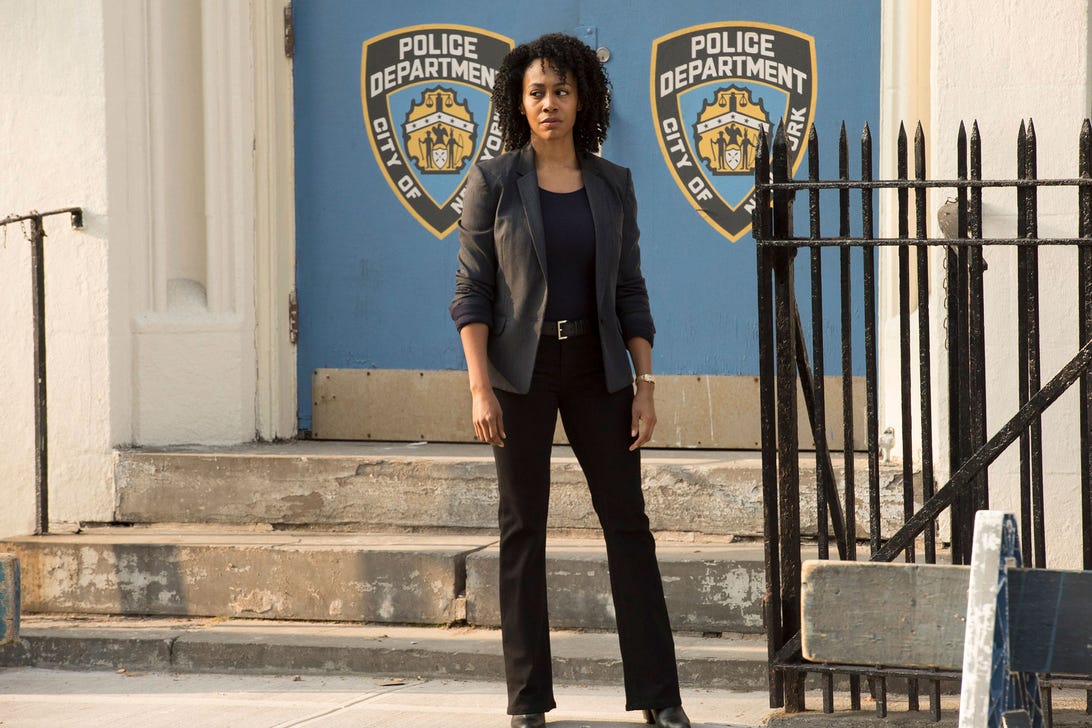
Simone Missick, Marvel's Luke Cage
Myles Aronowitz/NetflixI know you had an affinity for the writer Angelica Jade Bastién at Vulture and her critiques. One of them was that, essentially, Misty Knight should've gotten more shine, and I was wondering how, looking back, you thought the show did with its female characters.
Coker: Again, I learned from hip-hop -- something Puffy learned from Andre Harrell when Uptown launched. His whole thing was he wanted hip-hop R&B that would attract male listeners but also strong women. That was the whole thing with Mary J. Blige -- the music had that male aggressive hip-hop edge, but it still appealed to female R&B buyers. And so my attitude about Luke Cage was that I saw the reaction sisters had to Mike Colter, so let's put some more light on this brother. At the same time, let's have strong black female characters that don't necessarily play by their own rules but aren't dominated -- that have their own way of doing things.
Misty Knight, in terms of her being at the center of these investigations and then at the same time also dealing with the whole thing with Luke, it wasn't a rejection as much as it was thinking, we're bringing in Claire, what else are we gonna do with Misty? And I think relationship-wise in Season 3, we had different things that were going to lean [into] the dynamic between them that was only explored for one episode, but also giving Misty her own thing. But at the same time, the characters themselves were always very dynamic, strong, and centered. And not to mention the fact that we made a point to explore every hue of blackness, like Essence magazine come to life. Whereas other shows have been criticized for colorism, my thing was to show every shade, every hue, and at the same time have dramatic, dynamic characters that aren't just props or tropes. I think black female engagement on the show was extremely strong. At least [of] the criticisms I read -- and trust me, I read a lot of criticisms on Twitter -- that was never one that really stuck.
People that love Luke Cage tend to be a little older. And some people were like, "F--- Luke Cage, he's telling me to pull my pants up." I'm like, "That phrase was never uttered on the show ever!" But with Black Twitter, that became the reality in this weird way. That wasn't the case. You had people saying, "Why does Luke Cage have problems with the N-word?" And I'm like, "Yo, Luke Cage is more Big Daddy Kane than Hermain Caine!" My whole thing was, everybody's gonna have a different relationship with this word. And I want to be able to explore all of that. And at the same time, it's more offensive for you to tell me I can't use the word than for me to actually use the word. They let me do that. But then at the same time, you've got millennials and younger fans, because the word doesn't hold meaning in the same way, saying "Why is that such a big deal?" It was kind of old-man, old-school hip-hop. The fact is, you don't necessarily realize that you're old until you start doing the show and then kids remind you. [Laughs] My whole thing was, rather than trying to embrace something that I couldn't understand and be inauthentic, I'm just gonna embrace my Timberland boots, Carhartt era of hip-hop and make a love song out of that, no different than Martin Scorsese. If you watch his movies, they embrace the doo-wop and rock of the '70s. You're not gonna hear Guns N' Roses, you're not gonna hear Nirvana. [I decided] the '90s era of hip-hop would be the feel of the show.
https://www.tvguide.com/news/netflix-raising-dion-black-superheroes-kids/You talked about your children earlier. How have you seen your own kids respond to your show, if you let them watch it, and black superheroes in general? How do they and their friends respond?
Coker: My kids love the show. My daughter, she's eight, she wasn't supposed to watch the show but she did. She was on the couch watching. She asked questions about Black Mariah, and I'm like, "How did you even see that episode?!" I ended up purchasing a lot of the memorabilia when it went to auction, so I've got artifacts from the show around the house. The swear jar. I've got Pop's barber chair. I also bought hoodies. My intention actually is to donate some of those; I've already started talking to the Smithsonian African American museum about a couple of things. It was expensive, but it wasn't as expensive, ironically, as the Daredevil memorabilia, which again, shows that sometimes people don't value black heroes monetarily the same way. But I said, Look, I'm investing in legacy, and this history is important. And being the grandson of a Tuskegee Airman, from a very early age he taught me the importance of preserving moments of black history because people don't necessarily celebrate it until much later when they have a full context and understand the history that was made.
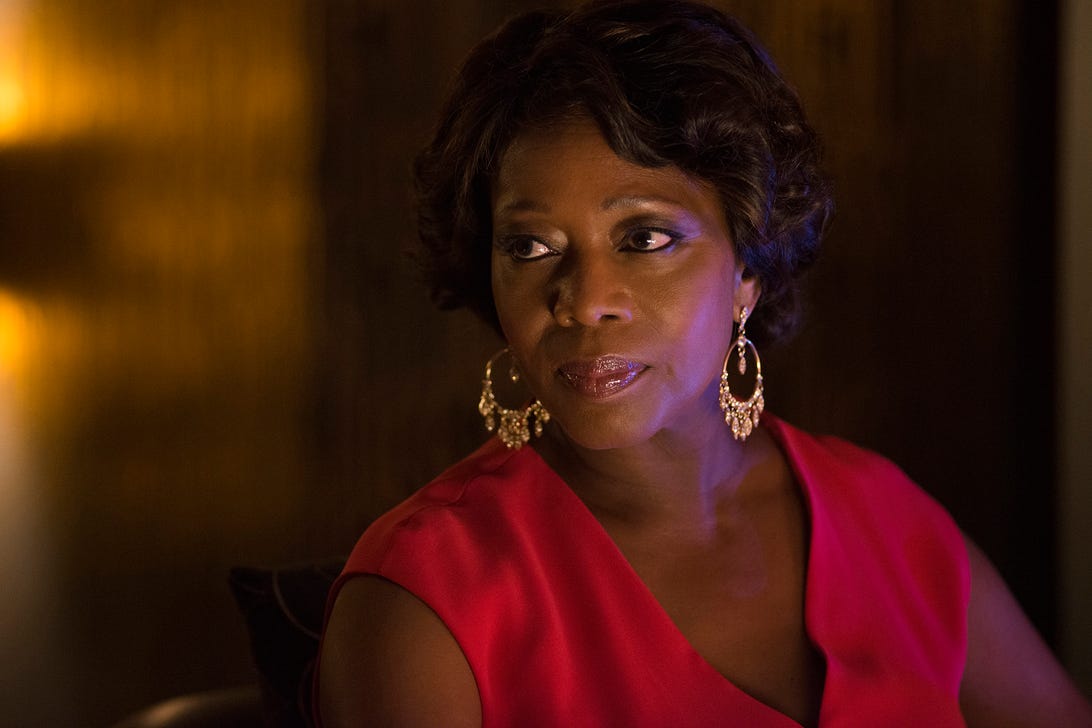
Alfre Woodard, Luke Cage
Myles Aronowitz/NetflixMy twins are now 14 years old. My kids grew up in a world where there was a two-term black president -- a president that was the epitome of class, dignity, intellect, and focus. You turn on the TV and you got black superheroes. You go to a movie theater and you got black superheroes. So the possibilities are endless. Whereas for my generation -- I'm 47 -- it never bothered me that Luke Skywalker was white. It never bothered me that Han Solo and Indiana Jones were white. But when you saw somebody that looked like you, they gave it a different meaning. You felt as if you were part of something. And that was honestly one of the things that influenced me to really want the job. It wasn't just the fact that I was a geek. I was with the twins. We were in the movie theater, and the trailer forCaptain America: The Winter Soldier came on. And it was the moment that The Falcon jumped off the side of the building to spread his wings. I looked at them and, it's funny, but that did something to me. I'm getting choked up. It was like they needed to see themselves. It's more important in some ways than we take for granted.
The Greatest Black Superheroes of All Time
There are so many more black people producing stories -- and more black superhero shows specifically. What would you say to the next generation of creators who want to do another black superhero show?
Coker: My thing is if you want to talk about the deeper context of blackness, it's your responsibility, but it's not a burden. In the '90s, people got this question like, "Are you a black director? Are you a director?" I'm a black showrunner. I'm always black. I wake up black, my perspective is black. But at the same time, I have to understand other people's reality and respect them in relation to my own. Exploring blackness doesn't take away from whiteness. And so it's possible to have a superhero show on its own merits, but then at the same time, if you want to explore deeper themes, then there's no reason that you can't. You cannot feel hemmed in.
Now [black creators] are finally able to explore the complexity of our realities. And there is no one central black truth. You can really explore things in very exciting ways, to me, like Watchmen. What Damon Lindelof did there was electrifying. It was absolutely amazing on so many different levels. If you read the graphic novel, not only was he respectful to it, he figured out a way to flip it, where he created his own thing but put black people and blackness at the center of the narrative without it just being a novelty. Like when you see what happened in Tulsa in the first episode, that's the first time some people even understood what Black Wall Street was. I mean, man, he has a permanent invitation to the cookout. And it was one of [HBO's] most successful properties. So I'm hoping that it gives Hollywood the courage to tell black stories in a universal way, you know? I'm hoping that the success of Luke Cage, the success of Watchmen, the success of Black Lightning, the success of Black Panther, allows different ways to explore all the various elements of blackness without it feeling like homework.
My grandfather was one of the Tuskegee Airmen. One of the lessons that he always taught me is that you still gotta fly the plane and you're still flying combat. So don't become black history while you're making black history. I never got caught up in being the fact that I was one of the only ones at the time or anything else like that. My focus was always on "do the absolute best job that you can." Because if you don't, someone else that looks like you won't be able to get that opportunity. That's why black excellence is, no matter what the genre is, mandatory, because you cannot take the shots for granted.
Marvel's Luke Cage is streaming on Netflix.
This interview has been edited and condensed. This story originally ran in February of 2020.
For Black History Month, TV Guide is celebrating black superheroes in TV and film. As part of The Rise of Black Superheroes, we're honoring the legacies of pioneers like Luke Cage, War Machine, and actress Eartha Kitt; examining how blackness shapes the identities of characters like Iris West, Black Lightning, and John Diggle; exploring what today's black heroes mean to kids of color; and celebrating the greatest black superheroes of all time. You can check out more content from The Rise of Black Superheroes here.
